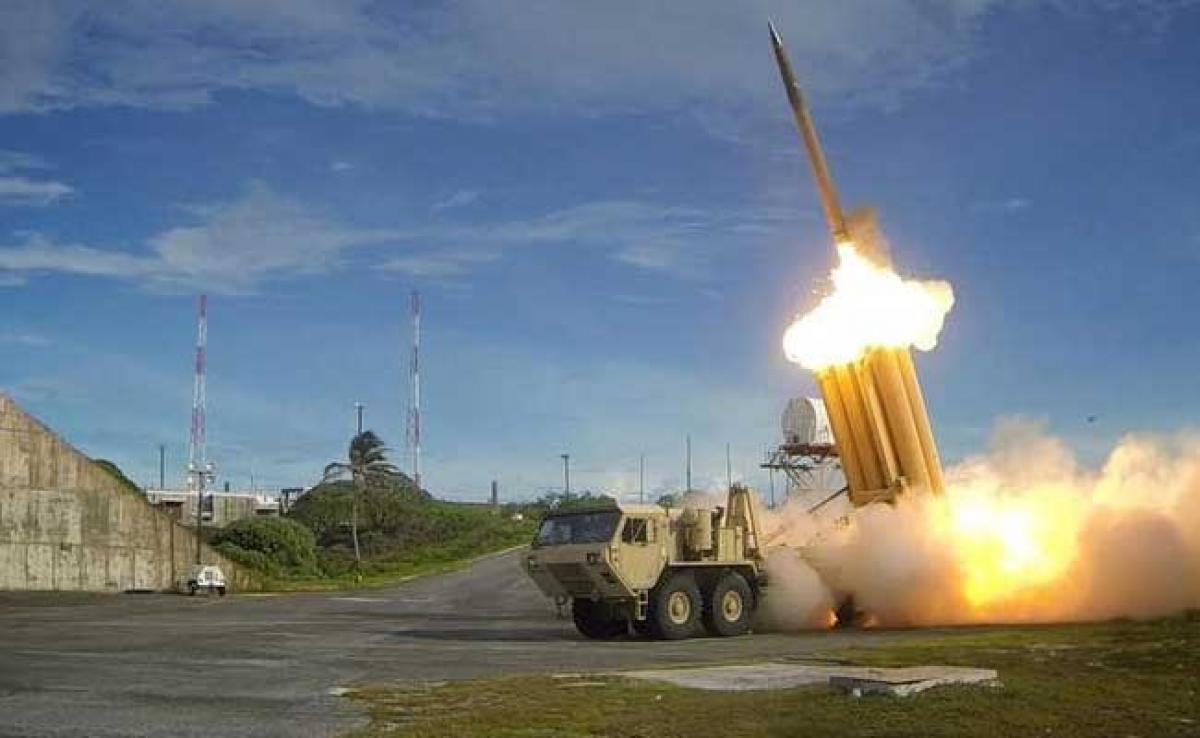Live
- Five-Year-Old Boy Dies After 55-Hour Rescue from Borewell in Rajasthan's Dausa
- Chaos in Parliament over Congress-George Soros link claims, BJP MP poses questions
- Bus Driver Arrested After Deadly Accident in Mumbai’s Kurla; 42 Injured
- Community lunch, a ritual to prevent drought in Adoni
- Rs 36.07 crore tribal products sold through TRIFED in FY24: Govt
- PM Modi to lay foundation stone for Ken-Betwa river linking project on Dec 25: MP CM
- 70 farmers trained as drone pilots in Anantapur dist
- AP Pensions: 500 Ineligible People Receive Pensions for Every 10,000
- South Korea's ruling party chief voices support for President Yoon's impeachment
- Defeat in Tirhut bypolls doesn't signify discontent among teachers: Bihar Education Minister
Just In

South Korea said the United States had reaffirmed it would shoulder the cost of deploying the THAAD anti-missile system, days after President Donald Trump said Seoul should pay for the $1-billion battery designed to defend against North Korea.
South Korea said the United States had reaffirmed it would shoulder the cost of deploying the THAAD anti-missile system, days after President Donald Trump said Seoul should pay for the $1-billion battery designed to defend against North Korea.
In a telephone call on Sunday, Trump's national security adviser, HR McMaster, reassured his South Korean counterpart, Kim Kwan-jin, that the US alliance with South Korea was its top priority in the Asia-Pacific region, the South's presidential office said.
The conversation followed another North Korean missile test-launch on Saturday which Washington and Seoul said was unsuccessful, but which drew widespread international condemnation.
Trump, asked about his message to North Korea after the latest missile test, told reporters, "You'll soon find out", but did not elaborate on what the US response would be.
Trump's comments in an interview with news agency Reuters on Thursday that he wanted Seoul to pay for the THAAD deployment perplexed South Koreans and raised questions about his commitment to the two countries' alliance.
South Korean officials responded that the cost was for Washington to bear, under the bilateral agreement.
"National Security Adviser HR McMaster explained that the recent statements by President Trump were made in a general context, in line with the US public expectations on defence cost burden-sharing with allies," South Korea's Blue House said in a statement, adding that McMaster requested the call.
Major elements of the advanced Terminal High Altitude Area Defense (THAAD) system were moved into the planned site in Seonjgu, in the south of the country, this week.
The deployment has drawn protests from China, which says the powerful radar which can penetrate its territory will undermine regional security, and from local residents worried they will be a target for North Korean missiles.
About 300 residents rallied on Sunday as two US Army lorries tried to enter the THAAD deployment site. Video provided by villagers showed protesters blocking the road with a car and chanting slogans such as "Don't lie to us! Go back to your country!".
Police said they had sent about 800 officers to the site and two residents were injured during clashes with them.
South Korea and the United States say the sole purpose of THAAD is to guard against North Korean missiles.
The United States is seeking more help from China, the North's major ally, to rein in Pyongyang's nuclear and missile development. Trump, in the Reuters interview, praised Chinese counterpart Xi Jinping as a "good man".
Tensions High
The North has been conducting missile and nuclear weapons related activities at an unprecedented rate and is believed to have made progress in developing intermediate-range and submarine-launched missiles.
Tension on the Korean peninsula has been high for weeks over fears the North may conduct a long-range missile test, or its sixth nuclear test, around the time of the April 15 anniversary of its state founder's birth.
In excerpts of an interview with CBS News released on Saturday, Trump said the United States and China would "not be happy" with a nuclear test but gave no other details.
Trump discussed the threat posed by North Korea in a telephone call with Philippines President Rodrigo Duterte, the White House said.
In an address to a summit of the Association of Southeast Asian Nations on Saturday, Duterte urged the United States to show restraint after North Korea's latest missile test and to avoid playing into the hands of leader Kim Jong Un, who "wants to end the world".
Two-month long US-South Korean joint military drills were due to conclude on Sunday, US and South Korean officials said.
The exercise, called Foal Eagle, was repeatedly denounced by North Korea, which saw it as a rehearsal for war.
In a further show of force, the USS Carl Vinson aircraft carrier group arrived in waters near the Korean peninsula and began exercises with the South Korean navy late on Saturday. The South Korean navy declined to say when the exercises would be completed.
The dispatch of the Carl Vinson was a "reckless action of the war maniacs aimed at an extremely dangerous nuclear war", the Rodong Sinmun, the official newspaper of North Korea's ruling Workers' Party, said in a commentary on Saturday.
The carrier group has just completed drills with the Japanese navy.
Japanese Defence Minister Tomomi Inada, in an apparent show of solidarity with Washington, has ordered the Izumo, Japan's biggest warship, to protect a US navy ship that might be going to help supply the USS Carl Vinson, the Asahi newspaper said.

© 2024 Hyderabad Media House Limited/The Hans India. All rights reserved. Powered by hocalwire.com







